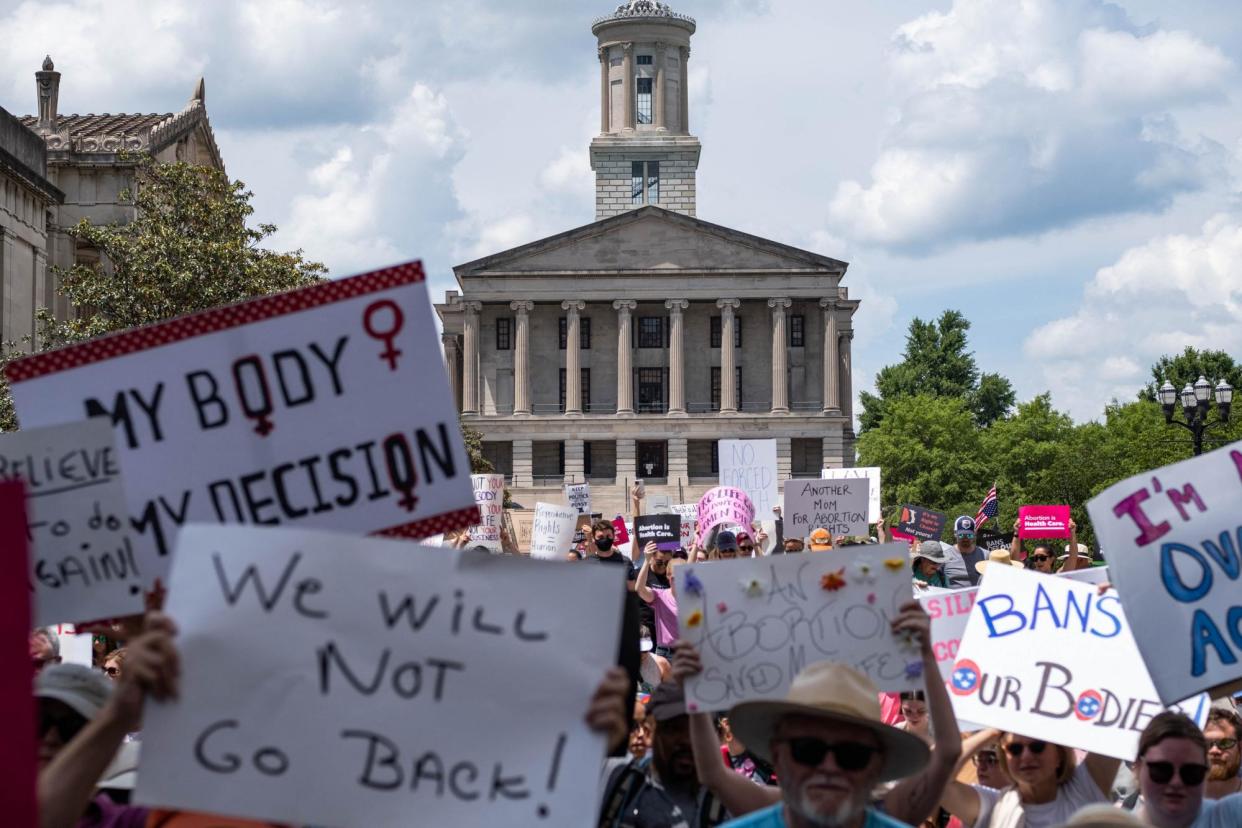Tennessee advances bill to ban people from helping minors obtain abortion

Tennessee state legislators moved on Tuesday to advance a bill that would ban people from helping minors procure an abortion without parental permission – an act that the bill has dubbed “abortion trafficking”.
Related: Anti-abortion centers raked in $1.4bn in year Roe fell, including federal money
If someone illegally “recruits, harbors, or transports a pregnant unemancipated minor” for an abortion, they could face three to 15 years in prison under the proposed law, which has now advanced out of a statehouse subcommittee after a hearing.
Although Tennessee already bans almost all abortions, as do more than a dozen states across much of the southern and midwestern United States, abortion opponents remain frustrated that people have continued to procure abortions since the US supreme court overturned Roe v Wade in 2022. Some individuals have fled across state lines for the procedure, while abortion rights advocates continue to give out abortion pills in a grey market so that people may “self-manage” abortions at home.
Medical experts widely agree that, early on in pregnancy, it is safe to use pills to perform an abortion on one’s own.
In the Tuesday hearing, the bill’s sponsor, Republican state representative Jason Zachary, said he saw the bill as an important shield for “parental rights”.
“In the state of Tennessee, you cannot take a child to an emergency room or any medical facility to obtain treatment without their parents’ permission if they’re under 18,” Zachary said.
“So this legislation simply says that if you are an adult, you are not allowed to take a minor who is not your child for any procedure related to an abortion without parental consent.”
At another point in the hearing, Zachary clarified his position on abortion: “I’m never good with an abortion. Period. End of story.” He later added: “My intent was to protect every life – every life and every unborn child.”
The bill would allow individuals to sue for “wrongful death” after an abortion – language that suggests that a fetus is legally considered a person. Establishing the legal personhood of fetuses is a longtime goal of the anti-abortion movement and could have sweeping implications for vast swathes of US law, as it could leave pregnant women pitted against the rights of the fetuses they carry.
Rapists would not be allowed to sue for wrongful death under the proposed legislation. However, during the Tuesday hearing, which lasted nearly an hour, state lawmakers tussled over other complications posed by rape.
“What is the situation if the sole parent or guardian is the rapist of the young lady who’s carrying the child?” Democratic state representative John Ray Clemmons asked Zachary.
The minor could go to court and get a court order that would erase the guardianship rights, Zachary said.
“Then if a child or an unemancipated minor, in this statute, wanted to seek health care, and their only sole parent or guardian was their rapist, that child would have to go to court to petition a court to get help?” Clemmons asked.
“Abortion trafficking” has become something of an anti-abortion bogeyman since the US supreme court overturned Roe. Last year, Idaho enacted a bill that also barred people from taking minors across state lines for an abortion without their parents’ permission, an act legislators in the state also labeled as “abortion trafficking”. A judge subsequently put that law on hold.
“Any woman who’s ever had to decide whether or not to terminate a pregnancy, I would say, has been in a conversation with herself about the sanctity of life,” Kacey Cardin, a Tennessee woman who has worked as an abortion doula and is now considering having children in the state.
“It bothers me when I hear as lawmakers talk about: ‘All life is sacred!’ But there’s very little care given to how sacred a woman’s life is and how sacred the decision about a woman’s future is.”
Cardin, who is now in her 40s, was raped, became pregnant, and got an abortion when she was just 16, she said to the Guardian ahead of the Tuesday hearing. She considers herself privileged because her parents were supportive and able to help her.
“To think about the amount of girls who already can’t afford the procedure – it’s such a stretch for so many people – and then to have to take time off to have to find a safe person they trust, someone who would keep their confidence,” Cardin said.
“I think about the amount of cases where young girls are raped by a family member – how do you find support to help take care of this when the people who are supposed to be taking care of you are the ones hurting you? That is so much more common than I think people realize.”

